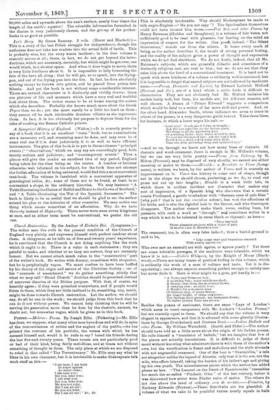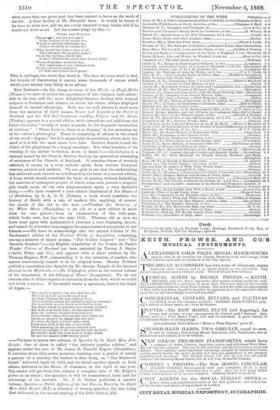Porrav.—Meletae: Poems. By Joseph Ellis. (Pickering.)—Mr. Ellis has done, we
suppose, what many other men have done and will do, in spite of the remonstrances of critics and the neglect of the public,—he has printed the contents of his portfolio, the verses with which he has amused himself and, would it be rude to say ? bored his friends during the last five-and-twenty years. These verses are not particularly good or bad of their kind, being fairly melodious, and at times not without something of thought in them. The only piece at which we are disposed to rebel is that called "The Tercentenary." Mr. Ellis may say what he likes in his own character, but it is intolerable to make Shakespeare talk such stuff as this :—
"I am here, I am here In tether sphere As tether clear; I am near you; See you, hear you; I am near you, See you, hear you; Me you not espy, But Jam all eye ; Me you not hear, But I am all ear ; "
This is absolutely intolerable. Why should Shakespeare be made to talk negro-English—" Me you not espy "? The Spiritualists themselves could not have treated him worse.—Fret Not, and other Poems, by Henry Bateman (Hodder and Stoughton), is a volume of fair verse, not sufficiently good to be read with pleasure, but leaving on the mind an impression of respect for the writer. One poetb, indeed, "The Silent Gravestone," stands out from the others. It bears every mark of being, as the author describes it, the result of strong personal feeling, and the reality of the subject gives a power of thought and expression which we do not find elsewhere. We do not doubt, indeed, that all Mr. Bateman's subjects, which are generally didactic and sometimes of a distinctly religious cast, are real to him ; but we do not see that they raise him above the level of a conventional treatment. It is hard not to speak with more kindness of a volume so evidently well intentioned, but it is impossible to forget that sacred subjects are not hallowed by mediocre verse.—Poems, Dramatic and Lyrical, by Edward Lodwich Mitford (Provost and Co.), are of a kind which a critic finds it difficult to characterize. They are not obviously bad. Mr. Mitford imitates his models fairly well, but then, his models are, for different reasons, not well chosen. A drama of "Prince Edward" suggests a comparison which would be fatal to a writer of far more skill and power. And, on the other hand, Alexander Smith, whose influence we seem to trace in others of the poems, is a very dangerous guide indeed. Take those lines, for instance, in which a lover urges his suit :— "Love you? 0 ask me if I live or breathe ; Ask the lost traveller on the Syrian plain, Writhing in all the agonizing pain
Of welting thirst; have water would he fain To cool his blackened tips; ask the cag'd lark, Perch'd on a dead sod in some alley dark, That sits with quivering wing and upturned eye,"
—and so on, through we know not how many lines of rhetoric. Of rhetoric and word-ornament, there is enough in Mr. Mitford's volume, but we can see very little poetry.—Poems from Calvary, by R. Hilton (Provost), may be disposed of very shortly, we cannot see either meaning or metre in them.—Rinaldo : a Novelette in Verse (Long- mans), is written, we learn, by the author of Vasco, and is scarcely an improvement on it. Vasco was history in some sort of shape, though not in the shape we should choose, preferring, as we do, to road our prose not cut up into lengths ; Rinaldo is a weak little tale, in which there is neither incident nor character that makes any sort of impression, of a Spanish king who discovers that a certain cousin Ferdinand, a gentle troubadour with "German eyes of pale blue" (why pale? that is not the caeraleus colour), has won the affections of his bride, and is also the rightful heir to the throne, and who thereupon disappears. The author cannot make blank verse, ending lines, for instance, with such a word as "through," anil sometimes writes in a way which is not to be tolerated in verse blank or rhymed ; as here— "They hatched These pleasant projects with a sense of gain In inverse ratio to RInaldo's loss."
Tho ornament, too, is often very false indeed ; thus a burial-ground is
said to be, "Like some rare and beauteous emerald
With pearly agates set."
Who ever saw an emerald set with agates, or agates pearly ? Yet there are some tolerable passages, if the mediocre were tolerable, which we know it is not. —Coda's Whispers, by the Knight of Morar (Black- wood).—There are many traces of poetical fooling in this volume, which is evidently the work of a man of culture and taste. Yet it is dis- appointing; one always expects something perfect enough to satisfy one, but never finds it. Hero is what might be a gem, yet hardly is :—
" A Violet and Primrose bed;
A morning Sun; some raindrops shed; A Breeze, that from the moorland blows, A swaying yew; an early rose;
A Maiden for a moment seen
Of blithest step, of years fifteen ; An Angel bright, of name unknown ; Ten Springs have passed ; ten Summers flown; No fairer picture Time has shown."
Besides the poems of sentiment, there are some "Lays of London ', which seem to court comparison with Mr. Locker's "London Poems," but are scarcely equal to them. We should say that the volume is very elegant in appearance, and that it is adorned with some ghastly illustra- tions by George Cruickshank and Gustave Dord.—Indian Ballads and other Poems. By William Waterfield. (Smith and Elder.)—The author should have told us a little more about the origin of his Indian poems. He °ails himself a "translator of ballads," but we imagine that few of the pieces are actually translations. It is difficult to judge of their merit without knowing what admixture there is with them of the author's own, but the versification is fluent and melodious and the style abounds with not ungraceful ornament. One of the boat is " Sharmistha," a tale not altogether unlike the legend of Alcestis, only that it is the son, not the wife, who offers himself, taking the burden of his father's age and giving up his own youth. The miscellaneous pieces which the author has added please us less. "The Lament on the Death of Epaminondas "resembles too much the so-called "Pindaric Odes" of the last century, before it was discovered how strict were Pinder rules of metre. The others do not rise above the level of ordinary vers de sorietcf.—Primitim, by Zachary Edwards (Provost).—These first-fruits are too plentiful. A volume of what we take to be youthful verses nearly equals in bulk
what more than one great poet has been content to leave as the work of his life. A fatal facility is Mr. Edwards' bane. It would be better if he were to write less, and we are sorely tempted to say, better still if he would not write at all. Let the reader judge by this :—
*PLEBS AND POPULITS.
"The pecige t Are not you and I Some portion of the people too, Whom to exclude reformers try, Unless we think as certain do?
"Why should the lowest class of all Thus arrogate the people's name? On us the burdens chiefly fall, Power's drawbacks which they do not claim.
"We need another word for this, The vagueness of one common term Of misconception parent is, Of wide and rooted error germ."
This is, perhaps, the worst that there is. The best we have tried to find, but despair of discovering it among some thousands of verses which would pass muster very, fairly in an album.































 Previous page
Previous page